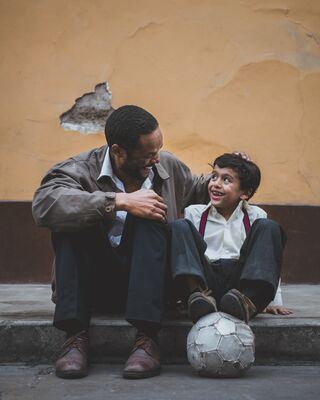Anger
Has Discipline Become a Dirty Word?
Setting limits without violence and abuse.
Posted October 11, 2022 Reviewed by Abigail Fagan
Key points
- Discipline should aim to teach children in order to keep them mentally and physically safe and to respect the rights of others.
- When parents constantly give in to children’s demands, it can lead to omnipotence, over-dependency and an inability to tolerate frustration.
- Over-zealous or harsh discipline is problematic for children, especially when it escalates to violence.

Today's parents sometimes feel criticised by older folks for their children's bad behavior. Echoes from past generations of child-raising are 'that child is spoilt' or 'he needs a good hiding'. It can be a frustrating source of conflict between parents and grandparents. The old authoritarian ways of raising children have given way to a more egalitarian approach. Today's children are rarely 'seen but not heard'. Rigid and severe child-raising is outdated and parenting is often more democratic nowadays. The world is more child-centered.
All of this is positive progress, but it is not without potential problems. Children between the toddler and teenage years do often need their parents and educators to take the reins and be the boss of them in a firm but gentle way. When parents don’t or can’t take authority, some children will take that role for themselves, leaving their parents powerless and unhelpfully compromised.
Why it can be hard to charge
Some examples of factors that can make it difficult for parents to set firm limits for their children are:
- When you don’t feel entitled to tell your child what to do
- When you are exhausted and worn out
- When you are trying to be the nice person
- When you are afraid of upsetting your child
- When you are afraid of being rejected by your child
- When you want to be liked and accepted by your child
- When you don’t trust that the bond with your children will survive when they are disappointed about not being able to do or get what they want
- When you prefer to serve your child rather than taking charge
- When you feel too guilty to upset your child because you have been unavailable or have made mistakes
- When you are ashamed about the way you have treated your child
- When you are a single parent trying to make up for things that have gone wrong
- When your child has suffered, for example, a chronic illness, disability or a history of a life-threatening experience or trauma
- When you experienced infertility or multiple miscarriages
- When you have an only child
- When you are trying your hardest to be a good parent
- When you don't want to emotionally damage your child or cause a mental breakdown
What happens when you don’t take charge?
Without limits and effective discipline, children can become anxious and tyrannical. This argument was made in a widely influential paper published in 1974 by Avner Barcai and Miriam Rosenthal, entitled 'Fears and Tyranny: Observations on the Tyrannical Child'. It can be disturbing and frightening for children when there is nobody stronger than them at home to set limits and protect them from danger. Sometimes, a child can become terrified by their own rage and destructiveness. Powerful and intense negative feelings are common and children are overwhelmed with anger at times. They need help and guidance to understand and express their strong feelings. So it doesn't make psychological sense to allow a child to hit, bite, scream uncontrollably and destroy things. Under-disciplined children can become too powerful and this can cause them severe anxiety.
Poorly disciplined children usually behave in ways that society does not accept. Other parents, relatives, teachers and friends generally don’t like rude, badly behaved children. This can lead those children to feel unlikeable, rejected and unpopular, with negative effects on self-esteem. Children are not yet equipped to rule the world, their households or their parents. They are not ready to get everything they want. Before they step into positions of real power in the world, they first need to learn the ropes from the adults in their lives. This sometimes involves the setting of limits. Finding the balance between too little and too much discipline can be an ongoing challenge for parents.
Too much discipline
The United Nations Committee on the Rights of the Child defines corporal punishment as 'any punishment in which physical force is used and intended to cause some degree of pain or discomfort, however light'. Research published in 2013 by Elizabeth Gershoff has shown that corporal punishment can contribute to psychological problems. It has also been associated with delinquent behavior in childhood and criminal behavior in adulthood, negative parent-child relationships and an increased risk that children will be physically abused. The Basic Education Rights Handbook, published in South Africa in 2017, includes a chapter by Faranaaz Veriava and Tina Power on corporal punishment. The authors argue that children who are disciplined with violence might become aggressive, violent and abusive themselves — and this can extend well into adulthood. Harsh discipline has been linked to internalising mental health problems in children (for example, depression and anxiety), as well as lower cognitive and scholastic functioning.
It can be hard for overdisciplined children to develop initiative, creativity and a sense of self. They can become too afraid to be or do anything that could get them into trouble. It can be hard to make friends or manage everyday life for children who are raised to be fearful about the consequences of saying or doing the wrong thing. It can sometimes take years of psychotherapy later as an adult to repair the damage done by harsh parenting. Not all children are so easily controlled and not all of them will have their spirits broken by highly aggressive and domineering parenting. Some will fight their parents’ bossiness, causing great conflict in the home. Others become exceptionally bossy and controlling themselves, having used their parents as role models.
Children can develop anxiety and a range of maladaptive defensive strategies when their early relationships do not feel safe. Fear, anger and aggression are triggered in a child when parenting is harsh, with no possibility of expression of that anger due to the dangerous and threatening attitude of the parent. It is extremely psychologically challenging for a child to be too scared to express anger.
There is great wisdom and sense in the ideological shift away from violence towards children in the family home. One of the best arguments I've heard comes from The Parent Centre in Cape Town. They explain to their patients and colleagues that encouraging parents not to hurt their children is part of a greater movement towards the attempt to build the foundation for a non-violent society. In my mind, that's a worthy aim wherever you are.
References
Barcai, Avner and Miriam K. Rosenthal. ‘Fears and Tyranny: Observations on the Tyrannical Child’. Archives of General Psychiatry 30, no. 3 (1974): 392–395. https://doi.org/10.1001/archpsyc.1974.01760090098015.
United Nations Human Rights. ‘Convention on the Rights of the Child’. Accessed 20 September 2020. https://www.ohchr.org/EN/ProfessionalInterest/Pages/CRC.aspx.
Veriava, Faranaaz and Tina Power. ‘Corporal Punishment’. In Basic Education Rights Handbook: Education Rights in South Africa, edited by Faranaaz Veriava, Anso Thom and Tim Fish Hodgson, 333–351. Johannesburg: Section27, 2017.
Gershoff, Elizabeth T. ‘Spanking and Child Development: We Know Enough Now to Stop Hitting Our Children’. Child Development Perspectives 7, no. 3 (2013): 133–137. https://doi.org/10.1111/cdep.12038.


